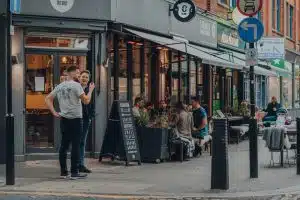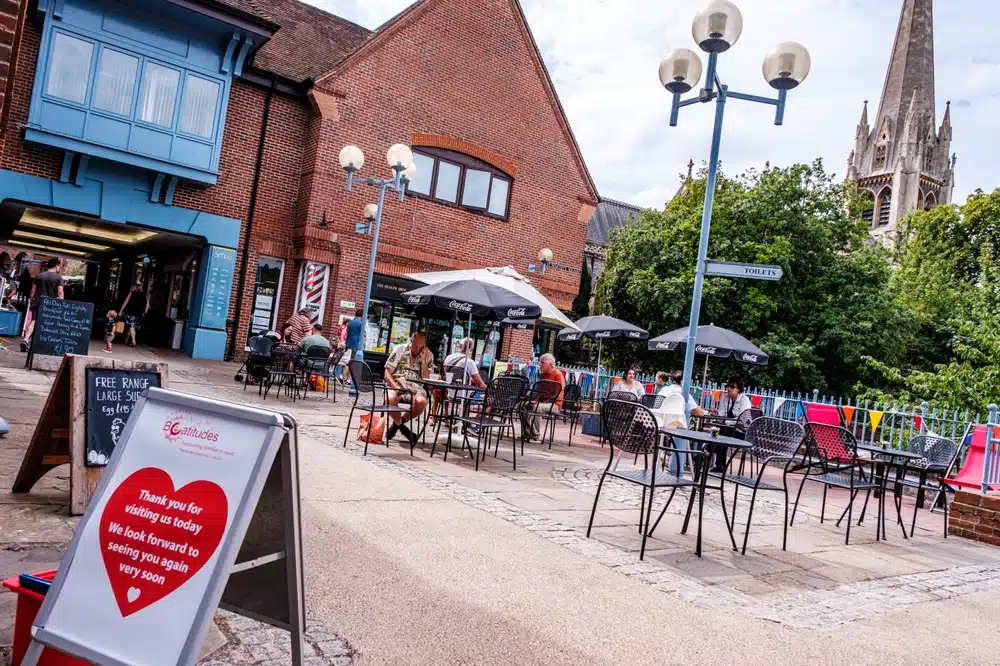
Increasing the number of covers businesses can take while maintaining social distancing is encouraged by lowering the processing time to five days and lowering the fee to a maximum of £100.
During the summer months, this initiative is anticipated to reduce job losses and increase profits for businesses.
England’s Chief Medical Officer, Dr. Chris Whitty, said that the economy had opened up as much as it could without a surge in Coronavirus infections.
Come September, it’s likely that schools and the hospitality sector will have a ‘trade-off’, which means cafes, pubs, and restaurants will be subject to more restrictions.
A pavement licence will let businesses owners place tables, chairs, and even pop-up bars outside their premises if the government decides to restrict hospitality businesses to outside seating areas only.
Furthermore, if your application isn’t processed within five days, a permission is automatically granted. Up until the 30th September 2021, you will be able to use the pavement outside of your premises once you have permission.
What is a pavement licence?
A pavement licence is a permission granted by the local authority for the use of the highway for tables and chairs, plant pots, umbrellas and A-boards. This type of licence is required if you want to put any of these items on the pavement outside your premises. The cost of a pavement licence varies depending on the size and location of your premises, but is generally valid for a period of one year.
Restaurants, bars, and cafes could apply to their Local Authority for a permit to place tables and chairs on the highways adjacent to their premises before the Covid-19 Pandemic. The 1980 Act contained the regime colloquially known as the “Pavement Licence”. This allowed businesses to make use of public spaces for commercial activity, such as setting up tables and chairs on sidewalks for customers. However, the pandemic has caused many governments to reevaluate these policies in light of social distancing guidelines.
Local Authorities have decided to temporarily suspend Pavement Licences, while others are still processing applications on a case-by-case basis. This has caused confusion and frustration for many businesses who are struggling to adapt to the new normal. It remains to be seen how long the Pavement Licence regime will be suspended for, or if it will be permanently scrapped in favour of alternative methods of social distancing.
In order to apply for a pavement licence, you will need to submit a written application to your local authority, along with a fee. Once your application has been approved, you will be required to adhere to certain conditions, such as not causing an obstruction or nuisance. If you fail to comply with these conditions, your licence may be revoked.
Who can apply for a pavement licence?
To apply for a pavement licence, businesses must first submit an application to their local council. The application must include a plan showing where the furniture will be placed and how it will impact pedestrian access. Once the application has been received, the council will consult with local residents and businesses before making a decision. If the application is approved, the business will then need to pay a fee and adhere to any conditions that have been imposed by the council. The types of businesses who can apply include:
- Pubs
- Cafes
- Bars
- Restaurants
- Sandwich shops
- Coffee shops
- Ice cream parlours
How to apply for a pavement licence
A pavement licence can be obtained through your local council’s website. The proposed outside area must be sketched as part of your application.
After that, you will need to provide information about the area’s dimensions, how many hours you want to occupy the space, and how many people you plan to accommodate.
You must display a notice outside your premises stating that you are applying for a pavement license.
Any nearby business or pavement user can express any concerns they have about your application in this way.
What are the terms and conditions of a pavement licence?
- If you own a business that sells food or drinks, you are eligible
- Outside areas are only permitted if there is a two-metre space between the seating area and the road (in special circumstances, this can be reduced to 1.5 meters).
- If your council gets back to you within five days, they can specify how long the licence will last. A three-month licence is the minimum they can grant
- It is safe to assume that permission will be granted for one year if they don’t get back to you within five working days. If your proposal is unsuitable, the council can revoke your licence
- Any additional evidence regarding your proposal, including location data and references to the furniture you intend to use, should be prepared
Further guidance
Further guidance provided by the government can be found here:
- inclusive mobility
- information to accompany your pavement licensing
- reducing the spread of respiratory infections, including COVID-19, in the workplace
- information about licensing of outdoor drinking and dining
Conclusion
Pavement licenses are subject to being granted by a vendors local council, these are subject to The 2020 Act regime which was extended by the Business and Planning 2020 (Pavement Licence) (Coronavirus) (Amendment) Regulations 2021 (“the 2021 Regulations”) to 30th September 2022. The feed back from local traders has stated that The pavement licence regime is generally considered to have been a success. As the new regime comes into play the process of obtaining a license will become longer, and the costs will increase.
Lee Jones is a seasoned Business Finance Specialist with over two decades of invaluable experience in the financial sector. With a keen eye for market trends and a passion for helping businesses thrive, Lee has become a trusted advisor to countless organizations seeking to navigate the complexities of finance.


